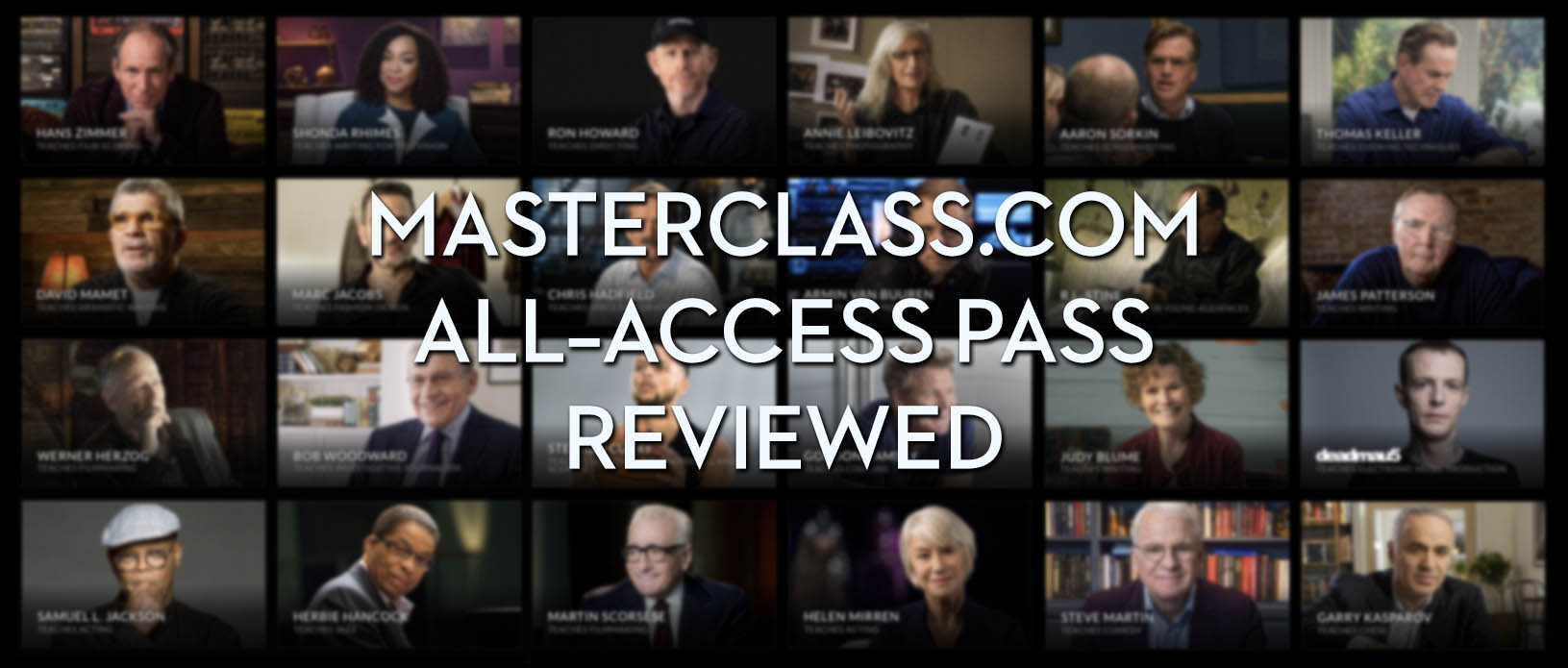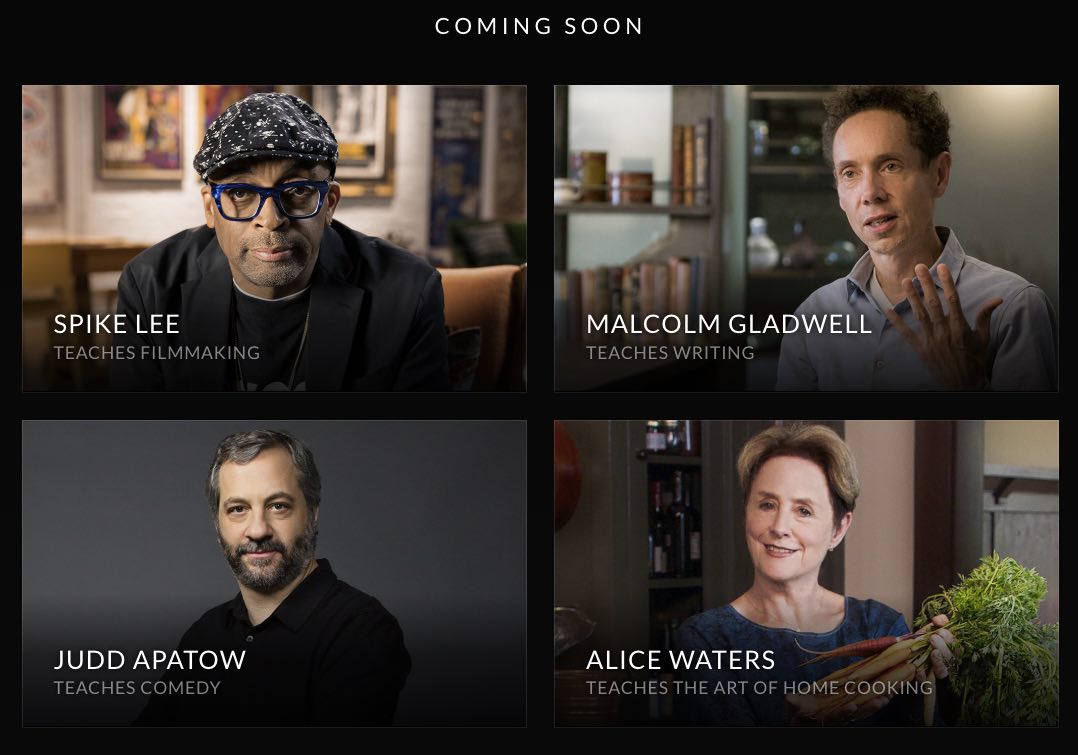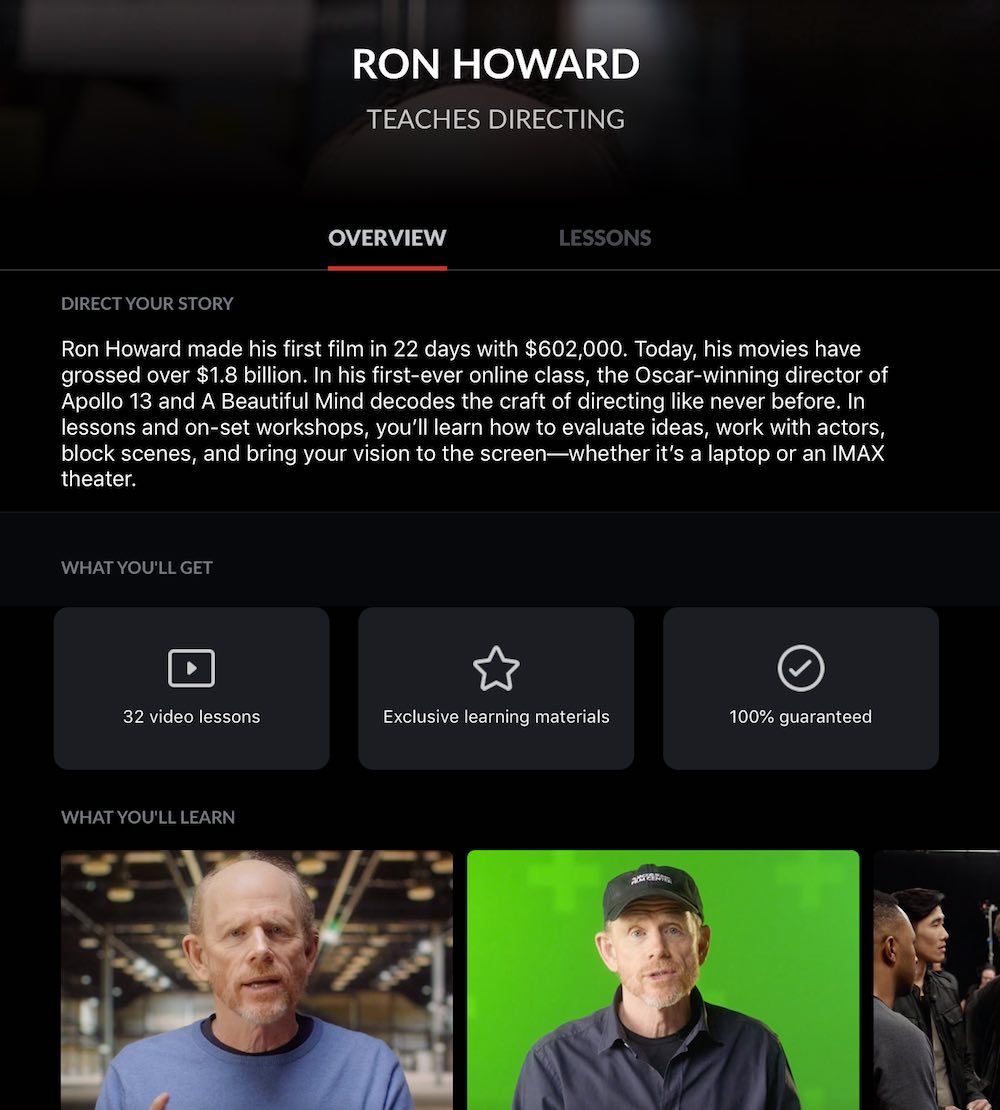Masterclass.com All-Access Pass – A Film Editors Review

Masterclass.com is probably my favourite website on the internet right now.
As a creative person I would highly recommend investing in a subscription as part of your ‘continuous professional development’.
Where else can you sit for hours at a time and learn from masters of their craft like director Spike Lee, author Malcolm Gladwell, actress Helen Mirren, astronaut Commander Chris Hadfield, photographer Annie Leibovitz, six-time World Chess Champion Garry Kasparov, comedian Steve Martin, screenwriter Shonda Rhimes, composer Hans Zimmer and many, many more!
I love learning new things, it doesn’t matter to much what it is, I just love learning.
I’m curious about the world and I find it fascinating to learn from inspiring individuals from all walks of life. If that’s how you feel too then you’ve got to check out Masterclass.com.
UPDATE June 2023 – Masterclass is now more affordable!
A new pricing tier, that works out to £10/month when billed annually, will save you £48/year compared to previous pricing of £14/month. The only difference is no downloads and 1 device.
In this post I’m going to talk unashamedly about how great the All-Access Pass is, what some of my favourite courses are, so far, and why it’s entirely worth the £170/$180 a year.
I’m actually not going to talk about many ‘film and TV’ masterclasses in the post, I’ll probably do more in-depth reviews of some of those, as I’ve already done for these classes:
- Aaron Sorkin Teaches Screenwriting
- Hans Zimmer Teaches Film Scoring
- Martin Scorsese Teaches Filmmaking
Instead I want to focus on everything else that Masterclass.com has to offer and why learning about completely different subjects, can improve what you bring to your current creative career.
In this post I reviewed Commander Chris Hadfield’s class on Space Exploration, author Malcolm Gladwell on Writing, Bob Woodward on Investigative Journalism and Samuel L. Jackson on Acting.
I’m looking forward to reviewing Ron Howard’s class on Directing and Shonda Rhimes on Writing for Television (and being a show-runner) as well as Spike Lee and Judd Apatow’s courses too, at some point in the future.
How the Masterclass All-Access Pass works
The All-Access Pass from Masterclass.com is pretty self explanatory.
You get access to everything, for the duration of your membership, and can watch it as many times as you like on a number of iOS devices.
That’s 35+ courses from some incredible teachers, with new courses added most months. Each course is a series of video lessons, supported by downloadable PDF workbooks and a very active community of students commenting on the lessons and feeding back on each other’s homework assignments.
There are also extra ‘Office Hours’ Q+A sessions, which some of the teachers do ‘as often as their schedules allow’, which gives you a great opportunity to ask one of your heroes a question directly.
Other than having access to everything, the best thing about the All-Access Pass is that you get early access to new courses, well before they’ve officially launched.
So for example, Ron Howard’s masterclass on Film Directing just officially launched but All-Access Pass holders have already been able to watch it for weeks!
Just to set the scene, here is a full list of every Masterclass course available today:
- Ron Howard Teaches Film Directing
- Annie Leibovtiz Teaches Photography
- Chris Hadfield Teaches Space Exploration
- Armin Van Buuren Teaches Dance Music
- Stephen Curry Teaches Basketball
- Gordon Ramsey Teaches Cooking
- Martin Scorsese Teaches Filmmaking
- Helen Mirren Teaches Acting
- Aaron Sorkin Teaches Screenwriting
- Thomas Keller Teaches Cooking Techniques
- R.L. Stine Teaches Writing for Young Audiences
- James Paterson Teaches Writing
- Judy Blume Teaches Writing
- Deadmau5 Teaches Electronic Music Production
- Hans Zimmer Teaches Film Scoring
- Shonda Rhimes Teaches Writing for Television
- David Mamet Teaches Dramatic Writing
- Marc Jacobs Teaches Fashion Design
- Steve Martin Teaches Comedy
- Garry Kasparov Teaches Chess
- Werner Herzog Teaches Filmmaking
- Bob Woodward Teaches Investigative Journalism
- Samuel L. Jackson Teaches Acting
- Herbie Hancock Teaches Jazz
- Christina Aguilera Teaches Singing
- Frank Gehry Teaches Design and Architecture
- Serena Willams Teaches Tennis
- Dr. Jane Goodall Teaches Conversvation
- Diane Von Furstenberg Teaches Building a Fashion Brand
- Wolgang Puck Teaches Cooking
- Spike Lee Teaches Filmmaking
- Malcolm Gladwell Teaches Writing
- Judd Apatow Teaches Comedy
- Alice Waters Teaches The Art of Home Cooking
At the rate they are adding classes, I doubt you could exhaust their library in a single year, so you should definitely get sufficient value from it all year round.
The New Masterclass.com App
With the release of a their dedicated iOS app Masterclass.com’s All-Access pass just got all the more accessible making the subscription a lot better value for money – simply because you’ll use it more!
The app is currently only available for Apple iPhone and iPad devices, but hopefully they’ll roll out an Android version too.
Inside the app there is a section called Discover which gives you several small samples of different courses, even if you’re not signed up to Masterclass.com at all (see the video embed below).
This means you can get a little taster of what a course might have to offer, beyond the trailer, before you hand over any money.
Price
From a financial point of view an annual subscription to Masterclass.com at $180/£170 works out to $15/£14 a month.
Which admittedly, is more expensive than Amazon Prime’s $99/£79 a year ($8.25/£6.5) or Netflix’s $11/£7.99 month, but it’s not too far off, that it’s not affordable.
I make this comparison because I’m kind of binge watching my way through various classes, much like I might a hit new show.
This definitely isn’t the best way to squeeze every last drop of wisdom out of each one, but I’m kind of viewing each class like a boxset or TV series.
You sit down to watch ‘just one episode’ and then you find yourself watching ‘just one more’… each lesson is just so thought provoking and engaging that I can’t help but want hear what they’re going to say next.
If you watched just one course a month you’d get through $1,080 (12 x $90) worth of Masterclass instruction. In this regard the $180/£170 seems like great value to me!
Helpful Things to Know
There are a few useful things to know about a Masterclass.com annual subscription.
First of all, any previous purchases you’ve made of individual courses go towards the cost of your first year’s All-Access Pass. Here is a snippet of the FAQ:
Do I get a discount on All-Access Pass if I’m already enrolled in classes?
We want to make sure all our existing students get to try out All-Access Pass. That’s why we’re having past purchases go towards your first year of All-Access Pass. You should see this reflected when you see the All-Access Pass option.
Also in order to cancel the automatic renewal of your All-Access Pass you do have to contact their support team, rather than controlling your billing through your login, which would definitely be preferable.
However, if you gift someone an All-Access Pass, the 365 days of membership starts from when they activate the gift (not when you purchase) and it also doesn’t auto-renew.
So if you’re the forgetful type, I suppose you could gift yourself a year’s membership if you don’t want it to auto-renew!
How to Get the Most out of Masterclass.com
There’s probably a few different ways to approach using Masterclass.com. But the two main ways I can think of are as follows.
One way is to use it as a serious student. Taking one course at a time in a dedicated fashion, working your way through the assignments, engaging with the discussions and using it to improve the work you’re doing outside of the course.
This would be a great way to help take something like a screenplay or a novel or your ability to cook for your family to a whole new level of understanding and ability.
Or you could simply engage with the instructors at the level of a curious casual observer – much like you might watch TED talks online, visit in-person evening talks or read a few biographies.
Other people are fascinating and learning how they do what they do so well is equally intriguing.
Now that you can easily carry and access the classes from your pocket, engaging with the content will be much easier, and make your commute far more interesting, but you might default to being more of casual observer, than a serious student.
Either way, one of the best ways to get more out of Masterclass.com is to simply keep a note book on-hand to write down thoughts, ideas and inspiring quotes (or episode numbers and timecodes!) to refer back to later.
Masterclass suggest that you could even work your way through the course at about 10 minutes a day.
In a year that would add up to 60 hours of viewing! That’s 60 beneficial hours of learning rather than 10 more minutes wasted on social media or watching trashy TV.
If you’re taking the studious approach you’ll definitely want to focus on one course at a time to stay on topic and in the flow of the ideas, as each lesson often builds on the next.
What makes for a successful masterclass.com course?
Having watched a few different classes now on Masterclass.com it’s clear that some a more successful and engaging than others. Here are a few thoughts on why that is.
Obviously if the person turns out to not actually be that interesting (to you) then it’s going to make for a hard slog. I’ve found that even if I’m only tangentially interested in the topic, if the instructor is an interesting teacher then I’m still hooked.
This brings me on to what is the most crucial aspect of a good Masterclass. How engaging the teacher is.
Some people are naturally excellent communicators, compelling storytellers and also able to lay out complex ideas in a clear and easy to follow manner. It also helps if they get excited talking about this stuff, which people like Hans Zimmer, Malcolm Gladwell and Steve Martin, definitely do.
Another aspect that helps to make the courses more interesting is they’re up on their feet actually doing some of the stuff they’re talking about.
So for example, this is one of the weaknesses of Scorsese’s course on filmmaking; he spends the whole time sitting in a chair talking. In most of the other courses the instructors are either coaching younger students through an exercise, directing a crew, or workshopping an idea with a team. This is also a way to ensure all the concepts they’ve been sharing are brought to life.
Even Commander Chris Hadfield talking you through an equation at a blackboard can be dynamic viewing, because of the way he does it.
Lastly, if there is solid extra curricular content, such as the Office Hours question and answer sessions or good discussions in the community Hub, this greatly extends the life of the course. Also if you’re inputting into these yourself, you’ll get more out of the experience.
My Favourite New Masterclass.com Courses
Commander Chris Hadfield’s Masterclass on Space Exploration is probably my all-time favourite class. I never thought someone describing equations in detail could be so compelling.
To hear his description of what it’s like to strap yourself into a rocket and launch from the earth had me transfixed for the entire (seemingly unedited) 8 minute monologue.
It’s very unlikely that I will ever go into space, I have no plans to be an astronaut, but this class is about so much more than that. It’s about ‘the pursuit of the nearly impossible‘. About grappling with uncertainty, risk and fear and coming out the other side in an entirely new place and as a new person.
There are 30 lessons in the course, which include:
- Astronaut training
- Rockets: What it feels like to launch
- Rockets: Orbital Mechanics
- Rockets: The Price of Exploration
- Leadership: Commanding the ISS
- Spacewalking: Spacewalks
- Mars: Living on another Planet
I could rave on and on about how great this class is, but I want to share a couple of quotes at length instead.
My favourite moment in the course (so far) was Chris’ description of what it’s like to launch:
It’s an incredible morning to wake up when you know that this the day that you’re leaving earth. It’s a day that you don’t take lightly, it’s a day that you’ve been preparing for intensely your whole life…
To fly a spaceship, especially a rocket ship, you have to give yourself permission to ignore everything else and to focus in on everything that’s about to happen. Because the ships don’t fly themselves. The ships can go bad so quickly, and there’s so many things you can do to save the day if you can just be ready enough…
So six seconds before launch, suddenly this beast starts roaring – like a dragon starting to breathe fire. And you can feel the thing pulse with the power that’s erupting underneath you.
You’re like a little leaf in a hurricane. You recognise that you’re puny compared to what’s about to happen.
This quote comes from Lesson 8: The Cost of Exploration, which tackles the inherent risks of strapping yourself to a rocket and venturing into the unknown.
This is what the pursuit of the nearly impossible can sometimes lead to, it doesn’t mean we shouldn’t.
The last thing we should do when confronted with complexity and failure is quit. If you quit, you’re done. You can’t go any further. Things can’t possibly progress. Unless someone else is willing to pick up the ball and do it.
I think with great reward sometimes comes great risk and each of us get’s to define what the great reward is.
Anything worth doing in life has risk… I decided a long time ago that exploring the rest of the universe is worth taking a risk for. To me that’s a worthy thing… I’m trying to do something that we haven’t done before and figure out how I can defeat the risk, how I can beat the danger, and put us in a new place.
Check out Chris Hadfield Teaches Space Exploration on Masterclass.com
I’ve been a big fan of Malcolm Gladwell for years. I’ve read all of his books and listened to as many of his superb talks and interviews as I could. So to say I was excited to discover that he had created a Masterclass is a bit of an understatement.
What surprised me the most about listening to Malcolm talk, in what’s a pretty candid situation, is that in real life he’s just like he is in his writing. Funny, astute, excitable and a natural storyteller.
If you’re a discerning writer of any kind, then listening to Malcom share his thoughts on crafting creative writing will be an invaluable experience.
Over 24 individual lessons the course covers topics like:
- Structuring Narrative: The Imperfect Puzzle
- Holding Readers: Controlling Information
- Developing the Story: Analogous Worlds
- Jargon
- Humor and Melancholy
- Drafts and Revisions
As an editor it’s in my interest to learn more about the craft of telling stories in an engaging way and Malcolm’s insights on with-holding information, building suspense and bringing together analogous worlds are superb.
These techniques all serve to draw your audience in and help them to connect, in a deeper way, to the humanity of the characters in his stories.
In his final lesson his shares his parting wisdom for aspiring non-fiction writers about what drives his own writing, he describes the psychological theory of ‘other minds’ – that we discover around two years old that other people think differently than we do. They have their own way of looking at and experiencing the world.
He then reads an excerpt from the introduction to his anthology “What The Dog Saw”:
Why is a two-year-old terrible? Because she is systematically testing the fascinating and, to her, utterly novel notion that something that gives her pleasure might not actually give someone else pleasure – and the truth is that as adults we never lose that fascination…
Curiosity about the interior life of other people’s day-to-day work is one of the most fundamental of human impulses, and that same impulse is what led to the writing you now hold in your hands.
He then goes on to say:
That’s what my writing is about, and that’s what I think almost all good non-fiction life is about. It is giving us a window into other people’s hearts, and souls and minds… It is teaching us of what goes on in other people’s minds. And without having some understanding of what’s going on in other people’s minds we can’t be fully human.
You’ll be lost forever on some narcissistic island. You’ll have no ability to transcend your own experience, no ability at all to see something from someone else’s perspective; to develop sympathy of another position, to empathise with another’s plight, or another’s genius. All things that are constituent of living a fully realised life, spring from the ability to go outside your own experience.
And how do we learn to do that? We learn to do that through stories.
Even thought I’ve already watched the entire course, I’ve dipped back in several times, simply because his energy and excitement are so infectious and he just has so many great stories to tell.
Read Malcolm’s work on Amazon’s Global Stores | Enjoy Malcolm Gladwell’s Masterclass on Writing
Growing up All The President’s Men was one of my favourite films. I just loved the methodical procedural nature of it, getting to see inside a newsroom and the superb performances from Robert Redford and Dustin Hoffman.
Later on I learned more about Bob Woodward, Carl Bernstein and the Washington Post’s role in the resignation of Richard Nixon. My love for ‘procedural drama’ continued throughout the years with David Simon’s The Wire being a real highlight.
So when I discovered that Bob Woodward was delivering a Masterclass on investigative journalism I was intrigued to say the least.
Having watched almost all of Bob’s class I can highly recommend it to any writer, documentarian or filmmaker who wants to beef up their journalistic chops and learn from a man who exudes authority, integrity and tenacity.
In 24 lessons Bob covers topics such as:
- How to approach in-depth reporting
- Hunting down the documents
- Developing sources
- Conducting the interview
- Lessons from Editors
- Developing the theory of the case
You can also download a transcript of his interview with President Obama and his interview with President Trump.
It’s also a fascinating watch simply from a historical perspective given that he has interviewed every sitting president in the past few decades, shares insider anecdotes for the first time and has seen more classified material than you or I ever will.
He shares quite a lot of detail on Watergate, Deep Throat and breaking the story that ended a presidency. He also shares why Gerald Ford gave Nixon a full presidential pardon.
Throughout the course Bob shares some excellent insights on how to research a story, uncover crucial documents and ground your journalism in solid facts.
“People want to be sources because people like to talk… in a sense everyone is a secret sharer even if they have something to hide….”
“I need your help – those are the four most potent words in journalism.”
All in all it’s amazing to hear from someone who has been at the white hot centre of US political journalism for the past 50 years.
It’s also encouraging to hear him talk with integrity about his own mistakes made along the way, as well as absorbing his serious regard for the facts, which is refreshing in our social media leveraged, opinion-dominated, ‘fake news’ culture. In the final lesson of the course Bob tackles how the internet has ‘transformed the landscape of journalism’ and why reporters should continue ‘to fight to uncover the truth – even in the face of attack’.
My favourite part of the course was hearing all of his personal anecdotes and insider stories of interviewing presidents and high ranking politicians, as well as learning about his patient and meticulous process.
Bob’s Masterclass is ideal for anyone interested in documentary making, journalism or just have a serious approach to backing up the things they read, write and say.
Sobering, serious and poignant.
Absorb Bob Woodward Teaches Investigative Journalism on Masterclass.com
I was surprised by how much I learned during Samuel L. Jackson’s Masterclass on Acting that directly applies to the craft of film editing.
Always be off book. It’s conscientious. It’s professional. It’s proving that you can learn the lines.
If you can’t learn them to try and get the job, why would they think you’re gonna learn them once you got it.
Prove to them you can learn them, by learning them. Be off book.
Here Sam is talking about how an actor should approach an audition (he once delivered 7 words for his audition for My Cousin Vinny; “Mud, you got mud in your tires.”) but I feel that it should be the same for any editor.
They too should know inside and out, the characters names, arcs, personalities, the structure and trajectory of the drama and the story’s main themes and how all of these interrelate and are enriched by one another. Even if that character’s role consists of only 7 words.
At this point Samuel L. Jackson’s acting career credit list is pretty epic, with 178 (and counting) credits to his name on IMDB.com, including:
Do The Right Thing, Goodfellas, Jungle Fever, Patriot Games, Loaded Weapon 1, Menace II Society, Jurassic Park, True Romance, Pulp Fiction, Die Hard with a Vengeance, Hard Eight, A Time to Kill, Jackie Brown, Out of Sight, The Red Violin, Star Wars: Episode 1 – The Phantom Menace, Unbreakable, Changing Lanes, Kill Bill: Vol 2, The Incredibles, Coach Carter, Snakes on a Plane, Black Snake Moan, Iron Man, Django Unchained, The Hateful Eight, Kong: Skull Island, The Hitman’s Bodyguard …
So to say he knows his way around both acting and the mechanics of film production is an understatement.
This is reflected in the make-up of the course, which includes an insightful acting workshop with some students around a scene from Pulp Fiction as well as lessons on:
- Creating Characters
- Breaking Down a Script
- Voice and Character
- Working with Directors
- Enriching Your Acting Practice
- Growing Your Acting Career
- Hollywood Lessons
After watching the course it’s clear that Sam has a high expectation of his own professionalism, experience and ability and of those around him.
For example, in lesson 4 (Case Study: Caveman’s Valentine) he speaks for 11 whole minutes about his approach to inhabiting a character and bringing them to life through attention to their posture, gait, voice, physical appearance, mental state, worldview etc. It’s pretty incredible the level of detail he goes into.
As editors we are shaping the performance of an actor, and the audience’s perception of them, through our own choices, but are we aware of the nuances that the actor is seeking to incorporate into a role. How are we using these conscious quirks effectively in the edit suite?
Sam also addresses much of the business end of ‘show-business’ (“It’s a look at me business“) including auditioning, getting agents who work for you, why managers can make a difference to your career, collaborating on-set, working with directors and a whole lot more.
What makes listening to Sam discuss his craft, his career and storytelling so enjoyable is not only his ‘presence’ and demeanor but also how easily quips and one-liners roll off his tongue.
On working with directors: “There are three kinds of directors; shooters, writer/directors and ‘guys who are lucky to be there’.”
On auditioning: “Don’t say: ‘I don’t think my character would do that.’ Because you’re right. Your character won’t do that because you won’t be hired and you won’t be getting that cheque.”
One thing that Sam shared about directors, which is surprisingly true is that, “the majority of the time the director is the one person on the set who has been on the least number of movie sets. And the smart ones know that and they let everyone do their job, because they’ve done it more, and they know how to get it done. The not-so-smart ones get in the way of the process.“
There are also some great anecdotes from pivotal moment’s in Sam’s career such as how he nearly didn’t get the part of Jules in Pulp Fiction, how his best scene from A Time to Kill was left on the cutting room floor or how he learned that you’re never too good to audition through meeting James Earl Jones outside a director’s office.
He also speaks candidly about his own journey to Hollywood (Calls his agent: Did Hollywood call yet? No.) into and out of rehab, and his fundamental love of acting.
This course is thoroughly entertaining, engaging and informative for creative artists of all kinds.
If I could get up every day and go somewhere and act I’d be the happiest person in the world.
Writers get up and write, painters get up and paint.
Why can’t I get up and go act?







Now that I’m “in,” how do I get “back in” the next day? I was given no number or identifying user name, etc. — tks!
Hi Lois, the email address that you signed up with will be your login name. But you’re best to get in touch with Masterclass’s support team directly.
Thank you for the great review. I have one follow up question if you have the time to answer.
Once you are signed for the all access pass, are you only allowed to take one course at a time, or can you be registered for multiple courses simultaneously?
Hey Michael. Yes you can take as many classes as you like at the same time. It’s great!
Absolutely insane that you, seemingly interested in the making of films, haven’t even mentioned Werner Herzog’s class (except for in the list). It is an amazing class, and you should watch it this instant!
(You almost got me convinced I should get the subscription though. I unfortunately bought Herzog’s class before MasterClass had a subscription-type offer.)
Hey Raymond
It’s a great class too but so far I’ve only had a chance to dip into it. The same with David Mamet! Glad to hear it’s worth some more time and attention though.
You should definitely get the subscription because your previous payment of Herzog’s course will be deducted from the total. So you’ll get it for half price effectively. (Approx)